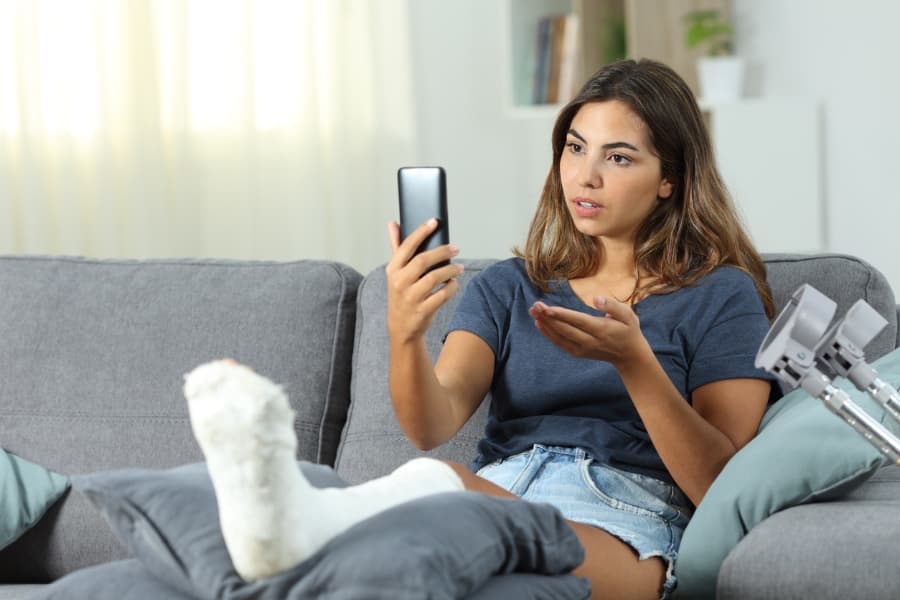
Millions of people post and comment on social media every day. Although it can be a great way to connect with others and have a little fun, it can also sabotage a personal injury case. Our lawyers at Thomas, Conrad & Conrad explain why it’s best to avoid social media until your claim is settled and finalized.
Insurance Companies Will Check Your Social Media Accounts
It’s standard practice for adjusters and insurance company lawyers to check injured victims’ social media accounts. Attorneys frequently subpoena social media accounts, emails, and other personal information. They do this to look for any reason to claim that your injuries aren’t as serious as you say they are and deny or minimize compensation. In fact, an insurer will run general internet searches to dig up dirt on you and learn about your personal life.
It’s easy to take a comment or photo out of context and accuse you of being dishonest about your injuries. For example, after you’ve been hurt in a car accident, a lawyer could take a seemingly innocuous photo of you having dinner with your family and convince a jury that your injuries weren’t really so bad if you were able to sit and eat with loved ones.
What You Can Do To Protect Your Rights
Ideally, when you’re involved in a personal injury claim it’s best to deactivate all your social media accounts and avoid commenting or posting on anything at all. If you can’t bring yourself to deactivate them until your case is over, be very cautious about what you do post. However, don’t delete any existing posts—this could be considered destruction of evidence and get you in serious trouble with the court.
Use The Most Stringent Privacy Settings
Set your Instagram and Twitter accounts to private. On Facebook, make sure only friends can see your posts. You can set your account so only friends can search for you under your name on Facebook and so your account won’t come up when someone searches your name on Google. Don’t accept any new friend requests.
You can also remove yourself from Google searches by unchecking “Public Search Listing” in Google’s internet privacy settings. Similar privacy settings are typically available on most search engines and platforms.
Let Friends And Family Know Not To Post About You
Ask loved ones to refrain from tagging you in pictures, posting photos of you, or commenting about your accident and injuries. Keep an eye on when you are tagged in photos – or better yet, change the settings on your account so people are unable to tag you in photos.
Post With Care
Being injured in an accident is a major life event, and it can be tempting to share your story and your progress with others. Don’t. The best thing to do is to not post any photos, videos, or comments, but if you must, be mindful of what you do post. Take into account who may see it and how it could be construed. If there’s any chance that it could cast doubt on your injury claim, avoid it altogether.
Review Your Online Profiles Regularly
Googling your name and searching for it on social media can give you and your personal injury lawyer an idea of what information about you is out there for the public to see.
Do not talk about your accident, injuries, or personal injury claim in emails, texts, social media messages, or voicemails. Being careless with these types of communications could derail your case and destroy your chances of recovering compensation for damages.
Do Not Join Any Message Boards Or Chat Groups
Even if you think you’re anonymous, there are ways to find out who is behind a screen name. Always assume that everything you put online is searchable, public information. This includes chat rooms, message boards, review sites, and dating apps.
Be Honest With Your Lawyer About Social Media Accounts
One of the most important things you can do to keep your case on track is to be up-front with your lawyer about everything. If you post or see something that could be problematic, let them know right away. You don’t want them to be blindsided by evidence that could sabotage negotiations or a court case.
It’s important to remember that your personal injury attorney is working toward an outcome that benefits you and protects your rights. Avoiding posting on social media after an injury can help to ensure you win your case and get the compensation you need to focus on healing and moving on with your life.
Contact A Personal Injury Attorney To Learn More
At Thomas, Conrad & Conrad, we are dedicated to making things right for injured victims and their families. Contact us online or call our Bath office at 610-867-2900. We serve clients in the Lehigh Valley, Pocono Mountains region, and throughout eastern Pennsylvania

